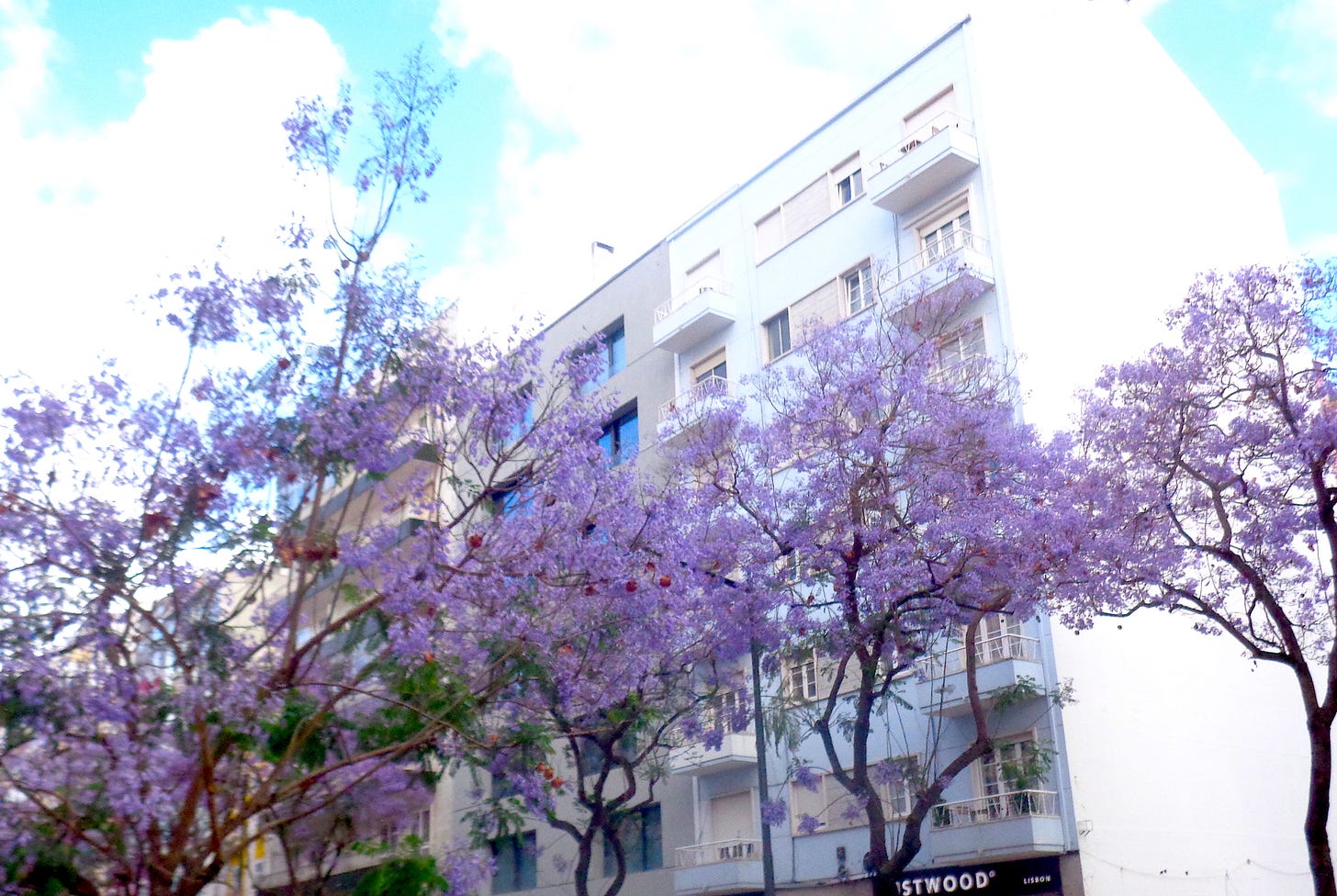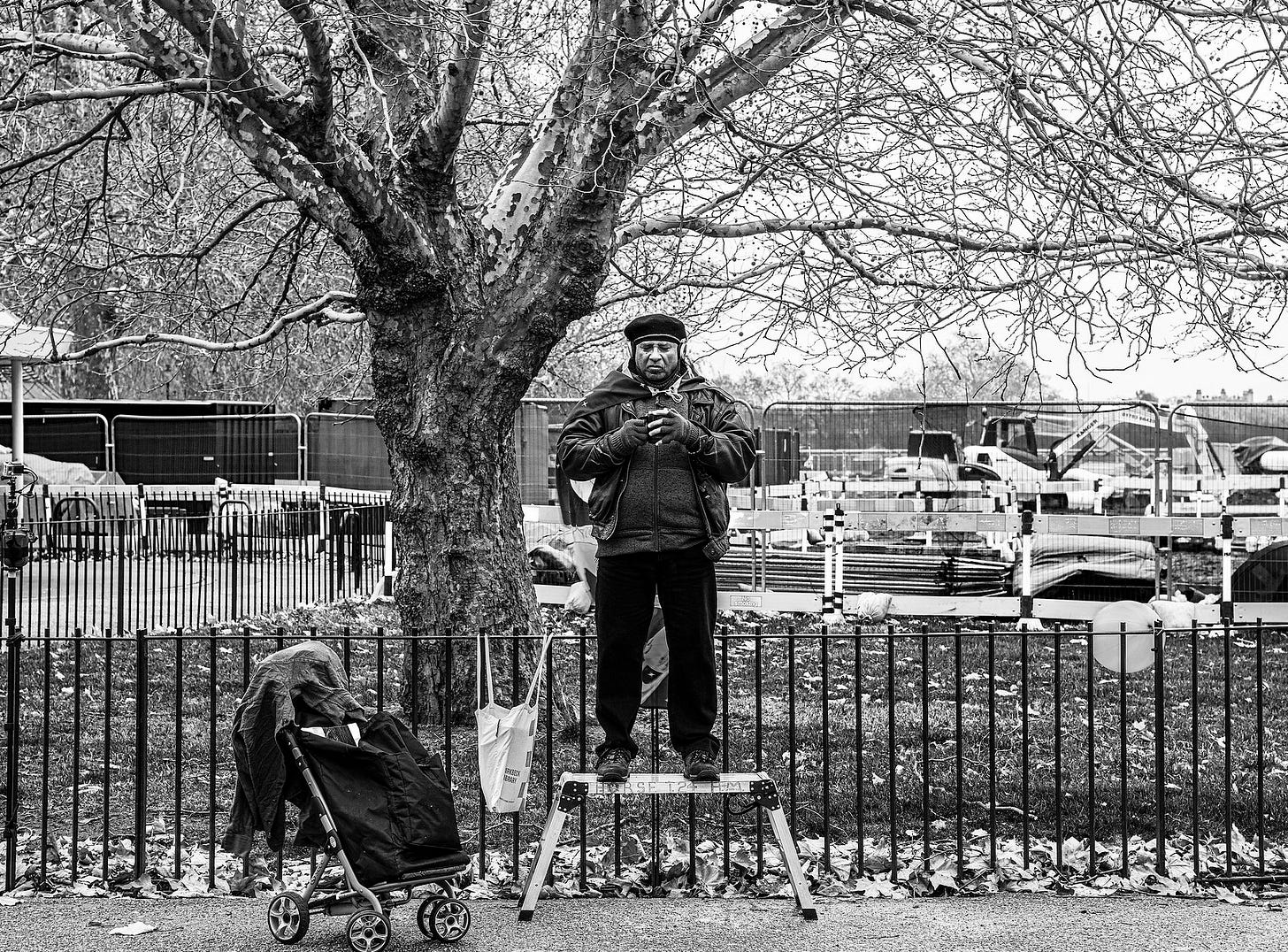This month, I’m leaving Portugal and returning to Britain. It won’t be a normal homecoming any more than it was a planned emigration.
By way of background for new subscribers: in the summer of 2020 I decided that, if there was another lockdown in England, I would leave the country. Accordingly, I flew to Lisbon in December with a suitcase, a laptop and a plan to get Portuguese residency before the Brexit deadline. The idea was that if I liked it enough to stay, I would return to Britain in the spring, pack up my flat and emigrate properly. But the combination of the travel restrictions imposed by the British and Portuguese governments and accommodation arrangements – it turns out you can’t rent a flat or turf out a tenant on a ministerial edict – meant it was eighteen months before I made it back to the UK.
This is a piece of two halves. It’s about both topophilia – love of place, the main focus of my writing before the world turned upside down – and the challenges of this new inverted world. In these strange times, the two have come together.
Travel and writing for me have been about love of place, exploration and (alternative) reality. I love the contrast between the familiar and the different. At times, arriving in a new place I've almost had the sense of travelling through a portal to a kind of parallel reality. In countries such as Tajikistan and Albania, where this feeling was most pronounced, I've got to experience other ways of being. The basics of life may be the same: the sun rises and sets and as social mammals we all need food, shelter and communication. But our ways of meeting these needs are so incredibly diverse, and vary so much with the climate, natural resources and topography in which we find ourselves. It’s almost as if we’re a species experimenting with life on earth, seeing how many variations we can come up with given the laws of our particular universe. Different country, different reality.
Be careful what you wish for. Before Times, the aim of my travel writing was to get under the skin of a place. Two years in Portugal, living in a variety of places as I tried to stay flexible enough to respond to the changing times, has given me a fast-track into what makes this country tick and what it keeps it significantly poorer than its neighbours. Oh, the stories! As the tourism darling of Europe and location of choice for digital nomads and affluent expats, Portugal has a very shiny image. Yet you hear almost nothing about the realities of living here, what lies beyond its temperate climate and the pretty eighteen-century facades of its buildings.
A book … yes, a book. Almost certainly, I will write at length about my time in Portugal. My previous books, drawing on my background in journalism, have been the product of deliberate research. But, for this accidental book, the journal I’ve kept throughout my time here will provide the necessary detail on top of my lived experience.
In the meantime, there are things I will miss about Portugal. First and foremost is the food. It’s not that Portugal has a superlative cuisine; it’s more the ease with which you can find nourishing, tasty, affordable food. There are cafes everywhere, serving hot meals to the locals: fried fish and tomato rice or steak, salad and chips bookended by a bowl of ‘sopa’ (the national comfort food) and a ‘sobremesa’ of rice pudding, flan or a cake. The cafes feed old people who don’t feel like cooking or have limited kitchen facilities, workers needing to refuel fast and parties of people obviously enjoying themselves. They are testimony to the rootedness and conviviality that characterises much of life in Portugal.
In London’s West End last year I walked round and round in search of somewhere to eat. I didn’t want a panini, or a burger, or a pizza, or a formal affair in a restaurant – just a quick, decent meal. There was nothing – cafes serving affordable meals in central London have been dying out for some time. Eventually, I found a tiny place I’d never noticed before serving a few hot dishes. It turned out to be Portuguese.
Another thing I will miss is the trains. To explain: objectively, Portuguese trains are nothing special. But after decades of paying large sums to stand on platforms hearing that yet another train has been delayed or cancelled and then struggling to get an information about how I might make my journey amid a barrage of announcements about security and penalty fares, Portugal’s trains feel like a minor miracle. Fares are affordable even for journeys across the country, while rail travel involves simply turning up at the station, getting on the train at the promised time and sitting on it until you arrive at your destination.
And the trees! Planes and oaks, pines and figs, cedars and cypresses, olives and jacarandas. They line the streets, fill the parks and adorn the miradouros of Lisbon. Majestic and magical. Wise and steadfast. I’ve often sat under them, finding solace and support during my long, unexpected exile.
I’m returning to a country that is in many ways almost unrecognisable from the one in which I grew up and spent most of my adult life.
It will require a new set of attitudes to start again in a place which, alongside the familiarity of its landscape and the speech patterns of its people, has changed so profoundly. One of the first stages will be to let go of what I call my institutional grief.
Somewhere in the computer I’m writing this on is a document with a list of British institutions in which I’ve lost faith. It includes the Church of England into which I was baptised and remained fond of until 2020. It includes the BBC whose output I used to hear or watch almost every day of my life. It includes the rich mosaic of charities and organisations whose work with the young, the old, or the homeless I sometimes covered as a journalist. All of this formed the comfortable blanket of shared, liberal values that made up the society to which I belonged.
At the institutional core of the Britain I loved was the National Health Service, a benign organisation dedicated to public health, even if it didn’t always have the means to meet the demands made on it. But now I can’t even see the word ‘NHS’ without a question immediately arising in my mind: does the health service still believe in informed consent? How about treating each person as an individual? Does Britain, for that matter, still believe in the foundational principles of western healthcare and is it prepared to uphold them? But I’ll come back to that later.
The various ways British institutions have betrayed the values they stood for or failed to represent the interests of those they exist for was going to be the subject of a Bafflement Essay. But I never got round to writing it, and now I want to move my attention away from institutional failure. Part of the reason is that I know my feelings are shared by many and that, out of the ashes of our collective disillusion, new groups and networks are emerging. They represent the makings of a society more genuinely based on human wellbeing and dignity and may in time form a new system of self-governance based on personal responsibility, collaboration and local needs.
For it’s been clear to me for some time that Britain is no longer functioning as a liberal democracy. How I loved that system of government! A consensus about a body of fundamental rights afforded protection to people, who affirmed their consent through periodic elections for the handover of power to a delegated group of citizens to run things on a temporary, conditional basis. In between times, a parliament of intelligent people provided the necessary checks and balances against the perennial risk of the abuse of power. Even small changes of law and policy were scrutinised, while bigger ones were the subject of public debate, with the groups likely to be particularly affected actively consulted.
After MPs were sent home in March 2020, decisions affecting everyone in the UK and the shape of Britain for years to come were made by a small number of ministers, civil servants and advisors. The Coronavirus Act was passed without a vote and renewed with little parliamentary debate. Now that politicians are back in Westminster, the habit of looking the other way while a few at the top make the decisions has continued. Nowhere has this abdication of the duty of scrutiny been more obvious than in the failure to address the matter of excess deaths, which in 2022 were the highest in decades and are ongoing. Independent experts have been scrutinising the official data for some time, but only recently has there been some speculation (avoiding the elephant in the room) in the media. Meanwhile the silence from elected politicians goes unbroken. When one MP raised the matter in the form of a public debate, all the MPs present left the chamber. You can watch the proceedings here and, if you found that interesting, there's a sequel. My God!
Britain's MPs are off the job, living in the Land of Corporate Capture. If I had a euro for every picture I’ve seen on social media of a British politician standing next to Bill Gates grinning goonishly, well, I’d be able to buy quite a few bottles of Portuguese wine.
While the publication of Matt Hancock’s WhatsApp files contained no surprises, the glimpses of the contents I didn't manage to avoid were distressing. They made clear that this was a man and a government out of control, certainly panicked, perhaps manipulated, but also hugely relishing their newfound power. As Brendan O’Neill points out in this article, the conversations reveal, rather than a concern to do right by the public, a determination to insulate ‘lockdown ideology from contrasting or contradictory ideas and data’.
People of Britain, we’ve been had! The lack of consequence is grieving to me – I'm old enough to remember when comparatively minor failings by our elected representatives would have been a matter of immediate resignation. (It was about a dozen years ago). Instead, as deception has piled upon deception – the false data used to justify the second lockdown, partying in No 10 while hearts broke in isolation, the deliberate use of propaganda to scare the population, the government rules on. Neither Parliament, nor the major political parties, nor much of the public seems to care.
The ministerial code, by the way, was recently ‘updated’ to remove the expectation that ministers who breached it would automatically resign.
Around the same time as the Lockdown Files were published, a former deputy health minister revealed that the government considered ordering the slaughter of the nation's pet cats, so confident was it of the compliance of the people and its right to issue orders to do the unthinkable.
In the autumn of 2022, on one of the five buses I needed to get home from central London during a train strike, I got chatting to a pleasant, intelligent woman who turned out to be a police detective. She was very concerned about the effects of lockdown, she told me, especially on people’s mental health. She had a friend who’d lost four people to suicide under lockdown. But she didn’t like to discuss the subject with the people around her because it was ‘too difficult’.
How can you have a functioning democracy – or indeed an open, healthy society run on any system of governance – when people are too frightened to say what they think?
In such silences is where the authoritarianism gets in and settles down for a nice long stay.
The society I’m returning to has taught me the hardest lesson of my life. Some fifty years after my father was conscripted into the Nazi army, I did a PhD in a related subject. Through the academic commentary on that horrific period ran a common refrain: such a thing ‘must never happen again’. At the time, I remember being both convinced and confused by this statement. Of course the holocaust would never happen again … and yet, what exactly was going to guarantee a future free of such barbarism? I now know it was a foolish thing to say and a foolish thing to believe. Because authoritarianism is not, as some have suggested, peculiar to the twentieth-century, a mere blip in modernity, but a social and political situation that can arise quite easily out of normal human traits.
The lesson that we in the West have yet to learn is that a minority of people will abuse power, if we, the majority, allow them to. The past three years have been a kind of giant Milgram experiment in which the citizens of liberal democracies have been tested to see how far they would go in their obedience to authority.
And I wonder: how many of my friends and neighbours would have killed their cats if the state had told them to?
Post-holocaust thought has tried to get to grips with the phenomenon of 'the authoritarian personality', the mystery of why and how ordinary people will comply when those in power make new and extraordinary demands. The literature on the subject sometimes distinguishes between ‘active’ authoritarians who align themselves with the rulers’ agenda and authoritarian conformists who comply from a desire for safety and ease.
In the few short months since I made the decision to return to Britain, I’ve watched from afar as a new kind of authoritarian personality has emerged. Across the country, some people, sometimes as part of advocacy groups but often just as ordinary members of their communities, have been calling for limits on the movement of their fellow citizens. The vehicle for this bizarre turn of events, if you'll pardon the pun, is the range of new restrictions on driving being proposed or implemented by local authorities in the form of Low Traffic Neighbourhoods, the expansion of the Ultra-Low Emissions Zone scheme and 15-minute cities.
As I suggest in this piece for Mercatornet, this new trend makes no sense in environmental terms: the policies in question involve only road blocks and segregating areas, permits, cameras and fines. It seems that while public authorities have seen an opportunity opened up by the Covid crisis to introduce measures that suit them politically and financially, an aspect of the popular psyche has also found a new playground. We could call the form it takes ‘the enthusiastic authoritarian’, someone strongly motivated by the short term gratification of adopting a superior position and insulting those who disagree with them. Unlike the psychological types identified previously, the enthusiastic authoritarian is not acting out of loyalty to a regime, or of fear of reprisal, social disapproval or, you might say latterly, a disease. S/he is aligned with a cause which s/he champions out of no particular necessity but with great enthusiasm.
I use the word ‘playground’ deliberately because this new form of authoritarian personality strikes me as curiously childlike, caught up in the pleasures of the game and unheeding of consequence, either for the people around them or the wider society in which they, too, will have to live.
Ah, the madness of Britain! No sooner does the country start to emerge from a lengthy shutdown with untold social and economic consequences. than some of its citizens and local representatives seek to commit new acts of self-harm. What quicker way of hobbling a society dependent on high levels of mobility, one with an inadequate and deteriorating public transport system, than to make it difficult for people to go to work, look after their families and generally go about their lives?
And here’s another strange feature of my new-old nation: the widespread name-calling and shutting down of questions, objections or alternative points of view. I remember my mother explaining to me as a child what Speaker’s Corner was about: the principle that everyone had a right to express themselves, no matter what others thought of their views. But in the Britain to which I’m returning, a public discourse of tolerance and civility has been replaced by name-calling and wilful misunderstanding. The Mayor of London recently called those who objected to the expansion of the ULEZ scheme ‘far right’ and ‘Covid deniers’. With that kind of example set by a public leader, it’s unsurprising that Jeer and Smear feel they have license to insult their fellow citizens.
Yet all this disappointing national behaviour has brought about an internal shift, a personal turn of events so delightful that I want to shout it to the terraced rooftops.
I'm post-tribal!
Such a complete abandonment of its values by my former tribe of the liberal Left has inculcated the recognition, part of my previous outlook but never so clearly understood as now, that no group has the final word about the good society. Nor can any individual be so ‘right’ that I can expect to agree with them about everything or feel entitled to assign them to a group of ne’er-do-wells.
During this crisis, I've come to appreciate the qualities of people who I would have previously dismissed for being in the ‘wrong tribe’. I've been grateful for their contributions and become able to recognise that certain qualities - those might appear as overweening confidence, which I don’t normally find attractive, are part and parcel of the personality making that contribution. Without them, these energetic high-profile dissenters, things might be even worse for us all than they currently are.
What a relief! What a liberation! It’s almost luxurious, this new way of being in the world. At last I can simply listen to what a person says and see what I think and feel about it without feeling the pressure to come to a conclusion. I may, after a period of watching and listening, come to a judgement about a person’s character, but I won’t be assessing everything they say for ‘correctness’ against some external list. Over the past couple of years, I’ve been hearing many new ideas, some stranger than anything I encountered before. My education encourages me to process ideas quickly, to place them into the categorises established by the frameworks favoured in Western culture. But how much nicer, and in the long term, probably wiser, to just let them lie, ready for further exploration, connections with other information and future events.
This, the new-found spaciousness that applies to other people and new ideas applies to me. I can grant myself room to change in the light of fresh evidence or because of a shift in perspective. It acts as a reminder that, as humans, we’re just trying to work things out.
Still, it's sobering to contemplate what will perhaps be the biggest challenge of this strange homecoming, one that will enable me to fully participate in what I half-jokingly call Britain’s pro-democracy movement: dealing with the dissonance.
There’s a specific instance of this dissonance that’s quite urgent and has life-changing implications. I'm talking about the disjunction between the growing recognition in Britain that the measures of 2020-21 did huge harm and were ineffective. How to reconcile the calls that they must not be repeated with the fact that the political class is quietly preparing the framework for more such measures in the form of the World Health Organisation’s Pandemic Treaty?
The treaty, due for ratification in May 2024, will be the first of its kind, granting the power to the WHO’s director-general to declare a health or climate-related emergency and then issue legally-binding instructions to the signatory nations. As well as border closures and quarantines, these could include the power to decide what medical treatments should be used and to mandate them on the populations.
Goodbye, informed consent! Farewell, life-as-we-have-known-it!
The absurdity of such a plan makes it, as Dr Tess Lawrie points out in this interview, hard to take seriously. (You can find a written summary of what’s proposed here.) But the British government has pledged support for the treaty, including the WHO’s bid to become lawmaker. Presumably, negotiations are continuing behind the scenes. Are Britain’s MPs aware of what’s being planned? Do they care what their constituents think or how they would be affected? Or are they trusting that Bill Gates, a major funder of the WHO, has everything in hand?
Yet I’m cheered by this tale of an English Socrates in the town square and by the way growing numbers of communities are getting together to tell the authorities that they don’t want to be trapped in their local areas. They show that, outside Parliament at least, Britain’s democratic traditions live on. This is the country I recognise and trust, and the one to which I’ll come home.











Good luck with the re-dis-/re-location. I think British democratic accountability and transparency is in a very, very bad way. The most depressing thing is I'm not sure how they can begin to be restored or improved, from here. But perhaps there's a way.
Lovely article, close to my own heart as someone who spent half my life growing up in Greece and then continued travel to many places. I too came back to the UK, I was wondering why you are coming back? I thought you might say in the article apart from your wish to help!
I run a free food network in my village in East Sussex called The Growing Network (https://www.facebook.com/TGN.FB), you are right there are so many wonderful initiatives happening all over the globe, it’s heart warming. I do not see the authoritarians getting their way, there are too many of us that are fully aware (and varying degrees thereof), they have blown it, what a shambles!!
I look forward to reading more from you.
Jo Morphy x